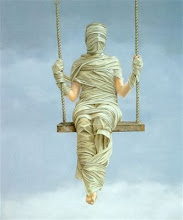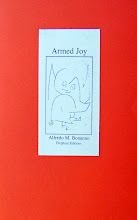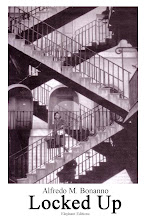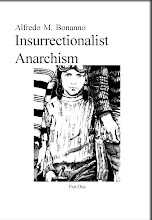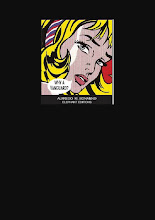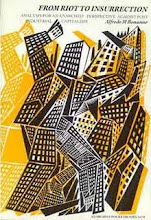21/04/2005
I know who killed comissario Luigi Calabresi on May 17 1972, outside his house in via Cherubini 6, in Milan, at a quarter past nine in the morning.
This is a serious statement, not due its judicial implications, for goodness sake, which I don’t give a damn about, but for quite other reasons, and these reasons are what I want to draw my readers’ attention to.
Basically, if we stop and think for a moment, what is there that we can be certain of? We get up in the morning, have a quick breakfast, rush to school, work, the nearest park to meet some friends, in a word, each towards their own daily business. In the evening we come back and lie between the sheets, nearly always the same as the evening before, which we can feel sure about the various events we have seen pass in front of our eyes during the whole day. As soon as some event takes place, no matter how simple, the coffee we had in the morning in the bar, everything surrounding it becomes confused, tends to suffocate in detail, and disappears in a non-requited desire for precision.
In the end we have a recollection of what happened, of the things we have done, but our affirmations about single events are so inadequate as to make us conclude that we cannot be sure about anything.
But how is that possible, some might say?
The answer is simple. We are only certain, always within given limits, about what we are really interested in, about what is so close to our personal feelings, needs, desires, dreams, projects that it gives us a punch in the stomach. We only remember the punches in the stomach.
In itself, life does not give us many punches in the stomach, and perhaps it is better that way.
Think what it would be like to have a life constantly lived emotionally on the edge, to the point of almost exploding, overcome by adrenaline. Some calm, please.
But because we are not bestie da soma, but men and women anxious to live this life, we tend to look at things in a more selective way. We filter the events that happen around us, not only those that we see directly with our own eyes, but also those that the great modern protheses of newspapers and television allow us to grasp, even things that happened thousands of miles away, far off in space yet as close as if they happened in our own back yard.
We have got used to such things, but there are some that strike us more deeply.
What does it mean to be struck, moreover in depth? It means that we are left open-mouthed, with a sense of pain, anxiety, indignation, disgust, or, which is the same from the point of view of the biological mechanisms our bodies unleash, of joy, enthusiasm, ebrezza, etc.
These events penetrate us and lock themselves into our certitude.
I know perfectly that there is no such thing as absolute certitude, in the sense of something objective and valid for everyone, if you want to be precise But when the blood boils in our veins for the fifteen dead straziati in the central room of the Banca dell’Agricoltura in piazza Fontana in Milan, even if a hundred years were to pass we would feel the same certainty of something indegno, that only the miserable servants of the State could accomplish.
That is the kind of certainty I want to talk about.
Each time I think of Pinelli being thrown out of that window of Commissario Calabresi’s office in the police station in via Fatebenefratelli in Milan, the blood boils in my veins.
So I am also sure about that. A thousand legulei colluding together to explain to me the reasons of the poor police inspector surprised by the poderoso colpo di reni of Pinelli to go and volteggiare in the night air of Milan, cannot convince me. I don’t even need to read the accounts of the comrades present in the other rooms who heard the accalorarsi of the interrogation, and the imprecations that preceded and followed Pinelli’s murder. These testimonies add nothing to my certainty.
In the same way the court acquittals, the filial declarations of young men who have grown up in the shadow of paternal blame, or the sudaticci memory of a widow for whom I have never felt any compassion take nothing from this.
A DECIDED MAN, SURE OF HIMSELF, EVEN CHARICATURED IN A FILM, BUT IN CHARGE OF THE SITUATION. It was he who was the diamond point of the police headquarters in Milan at the time when the bombs exploded, he was the one to get busy on the of the events, perhaps greater than he, but certainly not capable of stornargli the heart towards a moto of correttezza, in the first place towards himself. But what correctness can a pig be capable of, moreover a pig who wants to have a career at any price?
No one talks about this person any more in a concrete way, not being able to seem a myth, at least it seems a ghost. Passing years have drowned the personage, death seems to have flattened his characteristics in an iconography of martyr of the State.
Poor Calabresi, 34 years old, quite a gentleman, with a pregnant wife and two little children. An apartment on the third floor of 6 via Cherubini, a modest house. After his death the wife waits almost a year to take 156.000 lire a month pension. How sad.
But poor Calabresi saw life differently. He wanted to be a winner, he played dirty, and had managed to build around himself the fame of being a hard man, invincible. He was always first on the scene, crushed all the competition, his collaborators hated him, his superiors were scared of him. Man of karate and the cult of strength, he was such a hypocrite with everyone as to manage to pass off as sentimental, practising catholic, a god-fearing man. Basically, he learned this in America, where he had been working with the CIA. An experience that few Italian supercops had had at that time.
In the febrile days following the Milan massacre everyone was scared of everone else. For the first time t he sign of terror began to seriously penetrate the provincial, simpleton air of our country. Even the industrial city par excellence had never really known an era such as that which was about to unfold.
Why Pinelli? We don’t know, we’ll never know. It could have happened to another comrade. The attempt to throw someone down from the same window from the same Calabresi’s office had been done months before with Braschi, it could have been him to fall rimbalzando on the cornicioni. He escaped. The contest of the bombs at the Fiera were not at the same level as that of Piazza Fontana.
It was his job to raffazzonare as best as he could the thesis of the anarchist pista, he was the specialist of the Milanese anarchists, and of the others who had relations with the Milan comrades. Who better than he could gather the threads of the story already begun by Ventura, with the publication of the anarchist texts by a declaredly fascist publisher financed by the ministry?
Basically, the decision concerning the anarchists had already been underway for months, the proof being what happened with the bombs at the Fiera. Many comrades in prison precisely at that time. And all around, stirring things up, was poor Calabresi with his freshly pressed suit, his educated hard attitude, his culture (so to speak, but he always managed to borrow something here and there), his speed in making decisions.
Speed in decision-making. A man who had worked for the CIA could not fail to have the speed of the men of the CIA, spietati and cold in the execution of their job. Only recent times have demolished these commonplaces, showing how the Secret Services, from the CIA to MI5, to the infamous Mossad, are nothing but a bunch of incompetent and sprovedduti, doted with means which at some point make them seem greater and stronger than they really are.
There, Commissario Luigi Calabresi was one of those prezzolati and guaranteed assassins. Around him had grown a myth of imbattibilita, of the decisional strength that defeats all obstacles that face him.
This myth had its first incrinatura at the trial against ‘Lotta Continua’, where Calabresi had seemed to be in difficulty. He was accused, of having killed, or at least having participated in the murder of Pinelli, exactly what we are saying now . His stammering answers are still stuck in the minds of many comrades.
May 17 was an infausto day for the great commissario. Everything seemed to be going as normal, the usual morning routine: breakfast, goodbye to the pregnant wife, the two children, one two years old the other eleven months, what a beautiful family scene.
Even the hangman has a family. It doesn’t seem possible, but it’s true. And the hangman’s family sees the hangman’s job to be like that of any civil servant, moreover one of a certain level - the hangman’s job requires specialisations that not just anyone can accomplish. Behind the mask that hides the hangman there is also room for the prolific wife and numerous offspring.
That infausto day, at about nine o’clock in the morning, commissario Luigi Calabresi goes out into the street. His destiny awaits him, exactly at nine fifteen, in the form of two bullets, first one, then another.
Referto: discontinuazioni craniche, meningo-cerebrale, by bullets from a firearm (right occipital region).
The ambulance of via Crocebianca di Vialba screams its urgency along the city roads. At nine twentyseven commissario Luigi Calabresi dies inSaint Carlo hospital.
The autopsy on Pinelli’s body was carried out by Professor Ludovi, Mangigli and Falzi. Who are they? I don’t know. Some ordinary bonecutters? I don’t think so, at least one of them was a man of the secret services as transpired from a marginalnote published in the newspapers years later.
Why this presence? Because, once again 6they did not feel sure that everything had been found as it should (too many people in Calabresi’s room?) and wanted to get things over as quickly as possible, massacring in fretta e furia what remained of our comrade.
One thing is certain, that if Calabresi’s work was a macabre pasticcio (it suddenly transpired that Pinelli was wearing three shoes), that of the notomizzatori was done to perfection. After it, no counterperizia waspossible.
Calabresi, after leaving the entrance to his house, goes towards the salvagente in the centre of the road where his wife’s Fiat 500 was parked. At both sides a Primula and an Opel. The first shot strikes him in the right shoulder, the second blows up part of his skull. The space between the 500 and the Opel slowly fills up with blood.
The people there did not realise immediately, they hardly noticed the shots. In the spring air they almost seemed like scoppiettii of an old car. Then someone scorge the bocconi body, the blood that continues to swell its purpurea chiazza. The police, carabinieri, ambulance are called, everything that usually happens in such cases, just like an old abusato copione.Only this time accorrono alsothe high echelons of the Milan police. Guida’s eyes are full of tears. The old fascist prison guard, experienced in many misfatti and torture, is moved when he sees the body of the fido collaboratore on the ground, riverso in his own blood.
The Commissario finestra’s funeral is fastosa, loads of floral wreaths. The body is brought into the church. The auxiliary archbishop of Milan carries out the funeral service: ‘Fulgido example of dedication to duty’. It’s incredible how these people don’t haveany pudore.
Cardinal Colombo, referring to a declaration by Mrs Gemma Calabresi, states, ‘The most beautiful flower to bud on the blood of the murdered commissario is the widow’s pardon’. Incredible!
Pardon. What a magic word. We had to wait years to hear it said again, by other people, in other contexts, but always concerning Calabresi’s death.
But let’s proceed with order.
Of that morning in May someone, after many years, seems to remember something. What a splendid marvellous mechanism memory is. The memory of the pentiti, then, merits a study all to itself. In the town of Massa there is a man who sells crepes, who has a crepe chiosk, perhaps he also sells Cocacola and lemonade, I don’t know, anyway, he has all the air of an honest shopkeeper trying to make ends meet. Yet beneath his bonaccione appearance there lurks a dangerous criminal.
Moreover, this criminal talks, tells stories, narrates what he did that morning of that 17th of May 1972 in via Cherubini, when he sat in a car waiting, waiting, waiting.
But who was he waiting for?
Our friend gives a name, then another two, accusing them of being the mandanti of Calabresi’s killing.
He was only the assistant, the chauffeur of the material author of the deed.
But come on, my dear pentito friend, is it possible that the carabinieri have only one record and that all those who accept for Quattro soldi to wear the cassock of the infame always recite the same story?
The same for the little girl in the rome trial against the anarxchists (still in course in the court of assizes), among the continual ‘don’t remember’s, only repeats what he has memorised from the report prepared by the carabinieri?
There, there is something that the judges don’t know, that the pentito himself doesn’t know, and it is the fact that I know who killed commissario Luigi Calabresi on May 17 1972, outside his house in via Cherubini 6 in Milan, at a quarter past nine in the morning. And that taglia la testa al toro, for ever. The faccione of the pentito is only reciting a very bad copione.
But, let’s notjump ahead of our time.
To wait for the commissario invia Cherubini, was reveange.
An absolute silence accolse on 20 December 1969 at the exit of the obitorio Pinelli’s body. It was a quarter past three. It started to rain.
We went towards via Preneste.
His wife Licia had left a communiqué, ‘I earnestly desire that the funeral of Pino Pinelli, although open to all the friends who want to take part, come about in a decidedly private way, without the participation of organised groups, delegations or symbols’.
I don’t know why she made this declaration, certainly not for the reasons that I alone in my heart had also reached the same conclusion: symbols, banners of groups, perhaps even flags blowing in the wind, would have been out of place.
Only one black flag was to be present, in the end it turned out that there were more flags than necessary.
A wreath of flowers carried a little phrase, ‘The anarchists won’t forget you’.
I asked myself whether we would forget Pinelli, or whether that had already been done. The doubt stayed with me right to the Cimitero Maggiore.
Fossa 434, field 76.
There I no longer had any doubt. And, with me, the thousand comrades present had no doubt.
Calabresi must be killed.
Addio Lugano bello.
Revenge is a question of dignity. The enormity of the event must not only be commisurata to the death of Pinelli, and perhaps not even to the massacre where fifteen died and 90 were wounded. That would be a mere juridical equation, perhaps only a little more correct than that foreseen by the law books. And, in this sense, I wouldn’t be interested.
Revenge is an excess, in itself, not in the attack that it brings about. So, seeing things the other way around, the killing of Calabresi was not a commisurata reveange, commisurata to the deaths of piazza Fontana or Pinelli’s death. Even seeing things like this you fall into the juridical equation like before.
Revenge is therefore excess.
Not an eye for an eye, tooth for a tooth, which already in the biblical form constituted a rationalisation of preceding vindicative behaviour that was unpredictable, so a real penal code, while it seemed to most, erroneously, revenge alone.
The excess that is enclosed in revenge clears the field of any relation of equivalence, of any cimmuration. It is not revenge if it does not trabocca in the immane, in the barbarous cancellation of the enemy, in its elimination or, at least, in a arrecargli such damage as to make it impossible for him to forget.
If revenge were commisurata, it would be the social system as a whole to impose it, and there I am enclosed in a code, even unwritten, but still a code. The atmosphere would oblige me to avenge myself, following the rules, in the case of the contrary I would be badly seen and badly considered if I did not avenge myself or if I avenged myself excessively, giving damaging consequences for the environment itself.
Instead, if to solicit me to revenge was my offended dignity, it is only to that that I am responsible, and with it, therefore with the offended part of myself, with my consience, I must come to terms.And with myself there are no half measures, I with myself constitute an indissoluble totality, I am the world, the totality of the world, and who areca offesa to my dignity cancels the world, destroys me like the conscience of the world through my self, and deserves to be taken from the world.
Of course, those to grasp the deep sense of their own dignity are few. That is the profound mystery of some behaviour that seems inexplicable. Nietzsche felt offended in his dignity as a man before the spectacle of a vetturino who whips his horse and not being able to resist against his own world killed by that insensitive brute, decides to cancel him from that world, to cancel his own world, to cancel himself in madness. For the same reason, other comrades, in the face of their own offended dignity cancel the world in another way, they cancel themselves in suicide.
This way of seeing life develops and ends up becoming essential, man mano one realises the absurdity of the formal rules that sanction so-called society, not to mention the laws that fix the conditions of the existence of the State. Laws and behaviour that in the long term appear to be not only instruments of the enemy to asfixiate and render impossible that little freedom that even in a controlled and administered society it is possible to strappare, but in itself, as real storture, aberrant behavious also when they seem to be the very best of intentions.
The critique of daily life produces a conscience that in time makes itself more and more acute and sensitive, always more alacre in discovering ulterior terreni of desolation and isolation. All around fall that way the commonplaces of democratic possibilism, the illusions of politics, the positivity of the historical movement, the institutional concessions, the asceticism of certain recognitions. Si fa terreno bruciato, then you must decide. If one’s own conscience is capable of penetrating this crytaline fieldof the greatest possible clarity, if it discovers the tramethat constitutes the tissue of social relations, that subtle and almost impalpable trama that is often covered by appetising colours of the offer with which the misery of dominion disguises itself, one manages to make clear this timeless night, then one feels offended, deeply offended.
It is the offense of thousands of years of slavery and incarceration, of thousands of years of suffering and genocide, of thousands of years of submission to a few groups of dominators. Nothing of our past deserves to be saved, nothing has been given to me, and I have been able to snatch nothing from the enemy,except in the optic of one of its competitional concessions aimed at making me get to the banquet, even for a few crumbs, for some recognition of status quite marginal, for some stripes on a beret, for some bow by sornioni idiots who think they are the smartest.
And you can also reflect for years and years on this problem, read and reflect, until you feel tired and sad, and there is no page, no word, no gesture of man or woman near you who says anything clear, finally clear. You can row in the darkness for years, like a galeotto once upon a time, to exhaustion,until you fall dead on the oar without the others even noticing.
Instead, it can happen that an event illuminates you for a moment at the end of the road, that an even lrets you see in filigrana how the enemy is really made, what pasta it is made of, what crogiolo infernal his soul has emerged from.If such an event happens, if you are there too, along with many others like you, whom you know are living the same traumatic experience, and you see them, big men with calloused hands, kids trying to be cool, mature women whose thoughts to the war years, to the trucidati sons, young people who see their lovethat they avert likea sign of the purity of the world, almost dirtied by so much protervia, and you see them, all with tears in their eyes, impotent but with tensed muscles, if such an event happenswith you in it, it is no longer just any event, a fact like so many others (millions of people die killed barbarously and are taken fretulously to the cemetery), but that event has a different charge, it carries with it a tension that will not leave you be, it wakes you up in the night in a sweat and, sitting on the bed, you ask yourself what you are doing in bed, and if perhaps it’s not you who is dead and turning in the grave, while to be alive, very alive, is precisely Pinelli, with his niave beard of railway worker.
I realise that this might seem like a list of sensations felt by an exalted brain, by me who, I have to confess, that evening at the Cimitero Maggiore, fossa 434, field, shamelessly burst into tears. And if, putting it that way, it is a question of memories that risentono from the emotional state of the moment, and often these exalted emotional states, not being able to express themselves at that instant in something concrete (beating up a cop, for example), translate themselves into a frustration that makes one burst into tears. And sia, I agree.
But by thinking that way one loses something important, reducing everything to a sum of individual people who live single feelings, one puts aside the essential thing, that exceptionally important force that comes out of many people who feel the same emotive sensation, solicited by very similar feelings (none identical, for goodness sake, I know that), feel themselves attracted one with the other to constitute a homogeneous whole that doesn’t need pacts or written contracts or detti to constitute themselves. Suddenly, this collective force emerges and there, tangible, I can touch it, I can hear its voice, I can let myself be taken by its suggestions, address my gaze where it tells me to look, see with its eyes made of a thousand pupils what my poor short sighted eyes can’t see, remember what my poor mind alone cannot remember.
Suddenly, as iffrom the head of Zeus, di tutto punto armata, emerges the idea of justice. But it is a very strange idea, because it doesn’t rest on any pact, no order of preference. It isn’t an idea that wants to put everything in its place, exchange Pinelli’s corpse with that of Calabresi, there are no fungibili products. It’s not an idea that wants to guarantee revolutionary action , generically considered a legitimacy of continuation: what faith can the exploited have revolutionaries who let themselves be thrown out of the window like a box of old clothes without reacting.No, not even this. It’s not an idea that wants to be known, made their own by the people, so much so that there were no claims or political chatter by specific organisations of any kind, and to say that around that time there were a number of structures nascenti. It’s not an idea that puts itself above the others to recall to disturbed order of behaviour outside the rules, for the misdeeds committed by a certain Commissario Calabresi, after all, it is certainly not normal that someone being held at the police station be thrown out of the window during an interrogation.
If this world bases itself on commisurata justice, on the numerical calculations of input and ouput, of a punishing for the damage done and to do damage for the injury suffered, it is a world that has nothing to do with that idea of justice that came out collectively at that moment, that evening in Cimitero Maggiore in Milan. It was there then that that evening, without anyone wanted it or knew it, that came out an idea of justice that wasn’t there before, an idea that travalica and renders laughable individual desire, the individual fantasy of shooting in the headthe good commissario Calabresi, desire and fantasy cultivated without doubt by almost the whole of those present, but like all desires and fantasies, little by little, with a return to daily life, vanished into nothing.
Instead this idea of justice (that one could define ‘proletarian’ if, as rightly has been noted,on this term had not rained the powder of thousands of years to render it unusable), that not knowing how to call we will continue to call that way, simply, justice, this ideaof justice has continued its path in allof us, has held us together, comrades who have never been close to mewho were present that evening there, that whom I saw again only a few times elsewhere, in quite other affairs affaccendati, them and me, comrades for whom, let’s say it clearly, I have very little esteem for, if not rather aversion and disprezzo, well, for the simple fact that they were there too that evening, every time the far off voice but very lively voice of justice calls me, mettendomi in subbuglio my heart, I even go back to feeling close to these comrades.
That is why I know who killed Commissario Luigi Calabresi on May 17 1972, outside his house in via Cherubini 6, in Milan, at a quarter past nine in the morning.
These thousands, and more, comrades present at the grave 434, field 76, of the Cimitero Maggiore in Milan, all of us pulled the trigger.
No pardon. No pity.
Addio Lugano bella.
Catania 12 July 1998.
skip to main |
skip to sidebar

Some writings of Alfredo Maria Bonanno in English, or almost

Alfredo Bonanno was arrested on October 1st 2009 in Greece, accused of concourse in robbery. With him, anarchist comrade Christos Stratigopoulos.
Here are a few translations and part translations of a small portion of Alfredo's writing. This is a work in progress, many of the translations are as yet incomplete. Open links to find more of Alfredo's work.
Alfredo Bonnano Released
Nov. 22 Alfredo Bonnano was sentenced to 4 years imprisonment (which practically means that with the time served so far and the fact that he is over 70years old HE IS RELEASED
Christos Stratigopoulos (who took responsibility for the action)
was sentenced to 8 years and 9 months with the Greek law will probably be released at the end 2011
BY ANY MEANS NECESSARY
LINKS
click on any of these labels to read text
- "Community" sickness
- 1981 - Editorial
- A Critique of Syndicalist Methods
- A few notes on Sacco and Vanzetti
- A few notes on the revolutionary movement in Italy
- A little man in Singapore
- A million jobs
- A question of class
- Affinity
- After Marx autonomy
- Albania Laboratory of Subversion (Introduction)
- Anarchism and the national liberation struggle
- Anarchists and action
- AND WE WILL ALWAYS BE READY TO STORM THE HEAVENS AGAIN (Against amnesty)
- ANTI-INSTITUTIONAL MOVEMENT
- Are we modern?
- Armed Joy
- ARMED STRUGGLE. SOME REFLECTIONS.
- Autonomous base nuclei
- beyond syndicalism
- Beyond workerism
- But what is the imaginary?
- Class War
- Comiso - Organizational document of the self-managed leagues
- Considerations on illegality
- Dissonances (Introduction)
- Elephant Editions 1986
- Excluded and included
- Farewell to claiming
- Feral Revolution (Introduction)
- FICTITIOUS MOVEMENT AND REAL MOVEMENT
- For an Antiauthoritarian Insurrectionist International - Proposal for a debate
- From riot to insurrection
- From the centre to the periphery
- Good technology
- Guerilla Extraordinary
- Habits and idols
- Hegel
- I know who killed chief superintendent Luigi Calabresi
- Illegality
- Illness and capital
- Informal organisation
- Insurrection
- Internationalism
- Introduction to Sabate
- Introduction to Anarchism and Violence
- Introduction to Bratach Dubh English edition of Malatesta's Fra Contadini
- Introduction to Insurrectionalist Anarchism
- Introduction to Strange Victories
- Introduction to The Conquest of Bread
- Involuntary aspects of voluntary work
- Let's destroy work
- LET'S DESTROY WORK. New introduction
- Let's keep our feet on the ground please
- Lightening Conductors and Stand-ins - more shots of non-news
- Lightning Conductors and Stand-ins
- Lightning Conductors and Stand-ins (cont.)
- Locked up
- Looking forward to self-management
- Loss of language
- More on internationalism
- National Liberation Struggle
- nineteen years on
- No more crises
- Non-news about drugs
- Non-news about racism
- Ode to the Uniform
- On Feminism
- One's life on the line
- Order and chaos
- Otto Ruhle (Introductory Note)
- OUR ROLE IN THE PRESENT CONFLICT
- Palestine mon amour
- Pantagruel anarchist review
- Pinelli
- Prison and Prisoners’ Struggles - Introduction
- Propulsive Utopia
- Quality and the factory
- Restructuring Capital and the new democracy
- Revolution - Violence - Antiauthoritarianism
- REVOLUTIONARY VIOLENCE
- Science and the social revolution
- Self-management
- Severino Di Giovanni in Argentina 1923-1931 by Osvaldo Bayer
- Social banditry
- SOME NOTES -
- Space and Capital
- Stirner
- Stop the City? From information to attack
- Strategy and Methods
- Streamlined production
- The "end" of the crisis
- The aesthetics of anarchism
- The anarchist tension
- The area of autonomy and the anarchist movement in Italy
- The armed wing of science
- The Cruise missile base at Comiso can be prevented
- The ethical bank
- The insurrectional project
- THE LANGUAGE OF TECNICS -
- The logic of insurrection
- The moral split
- THE NECESSARY DESTRUCTION -
- The priority of practice
- The refusal of arms
- The revolutionary project
- The revolutionary struggle
- The significance of an insignificant event
- The struggle for self-managed social space
- The tyranny of weakness
- The whole and the part
- The young in a post industrial society
- Theory and action
- Towards anarchist antimilitarism
- TOWARDS THE GENERALISATION OF ARMED STRUGGLE
- TRANSFORMATION IN THE WORLD OF WORK AND SCHOOL -
- TRUTH -
- Unemployment in Italy - How come everything doesn't explode?
- Untitled
- Violence and non-violence
- What are anarchists
- What can we do with anti-fascism?
- Why a vanguard?
- Why Insurrection
- World domination in a few words

